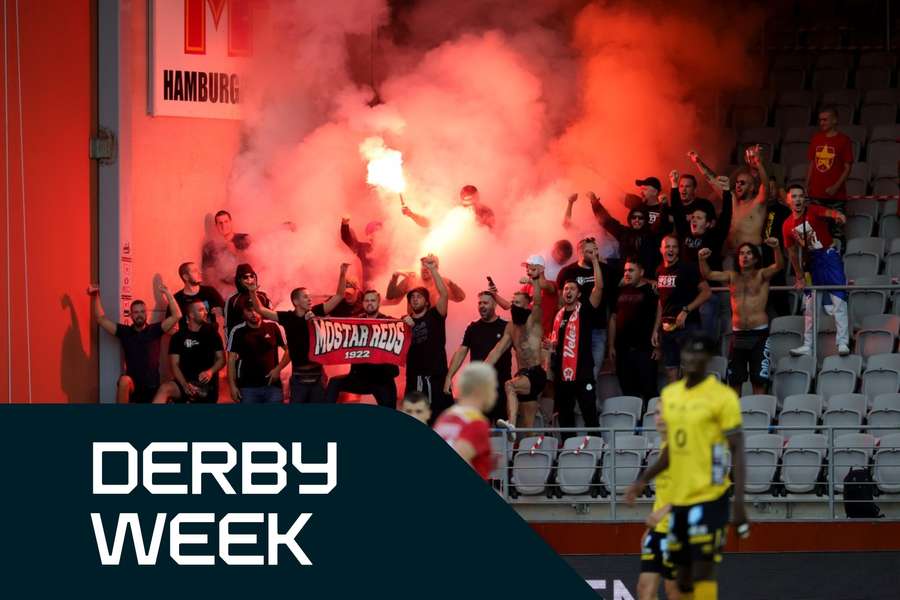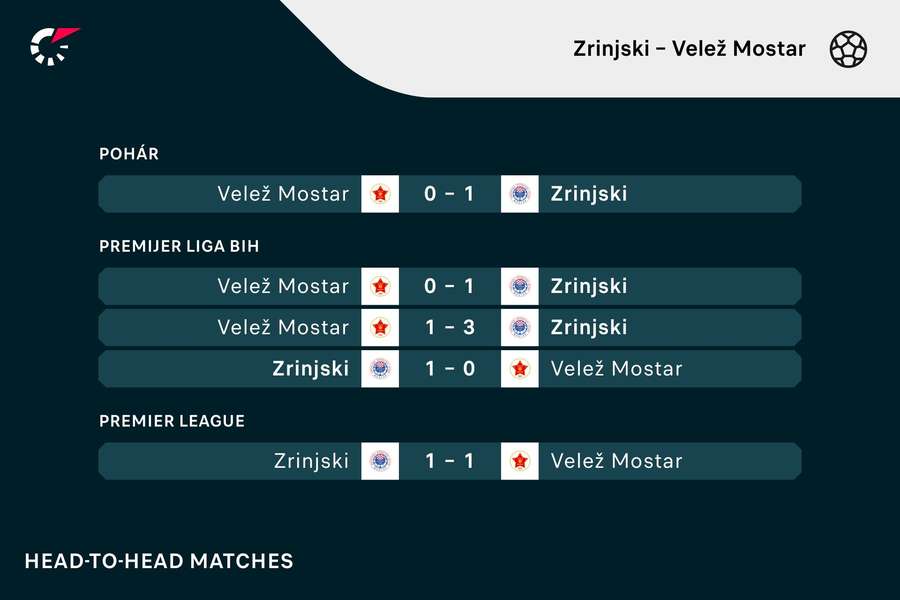Derby Week: Mostar - a city of two clubs divided by a river, war and faith

The old bridge has been standing there again since 2004. The original one, dating back to the 16th century Ottoman Empire, was destroyed during the Bosnian War of Independence in 1993. The bridge symbolically reconnected two worlds torn apart by war, but the old wrongs will not simply disappear from the town and its inhabitants.
This tension is especially heightened when the Mostar derby is played - a football battle of left bank Neretva against right, Muslim Bosnians against Christian Croats, Zrinjski and Velez football clubs.
After the collapse of socialist Yugoslavia in the early 1990s, communist rule was replaced by a coalition of three ethnic parties in what is now Bosnia and Herzegovina. After Slovenia and Croatia declared independence from Yugoslavia, there were significant tensions among the people of Bosnia and Herzegovina.
The Serbs there were in favour of remaining part of the newly forming Yugoslavia. Muslim Bosniaks and Croats, on the other hand, wanted independence. The Bosniaks and Croats declared the independence of Bosnia and Herzegovina by referendum on 3 March 1992. The Serbs boycotted the referendum and established their own republic.
The political strife escalated into an armed conflict, which victimised many Bosnian citizens (many of them via the so-called 'ethnic cleansing') and greatly increased the mutual hostility between the peoples of the country. In this war, practically everyone fought against everyone else.
The Bosnian War was helped to be resolved by the United Nations. The fierce fighting only ended under pressure from the USA with the signing of a peace treaty in 1995. However, the complexity of the relations between the ethnically, religiously and politically fragmented populations in Bosnia and Herzegovina, and indeed throughout the Balkans, often erupts into conflict even today.
Football often opens up old scars in the Balkans. One of the tensest derbies is the Mostar city derby ('Mostarski gradski derbi').
A city cut in half
The two biggest clubs in Mostar, the capital of Herzegovina, are HSK Zrinjski and FK Velez.
Founded in 1905, Hrvatski sportski klub Zrinjski Mostar is the oldest football club in Bosnia and Herzegovina. It is supported by the Croatian population of the city, which is concentrated on the right (western) bank of the Neretva River.
The 'Zrinjski' in the club's name symbolises a reference to the Croatian noble Zrinski family. In addition to the name, the club's emblem also references its Croatian identity.
FK Velez was founded in 1922. The name of the club is derived from the mountain Velez near Mostar. Velez is a club of Bosnians, a Yugoslav nation with an Islamic tradition. Bosnians live mostly on the left bank of the Neretva River in the eastern part of Mostar.
Today, the club is named: Fudbalski klub Velez Mostar. The original name Radnicki sportski klub (Workers' Sports Club), in both acronym and symbolism, remains part of the club logo.
The rivalry between the two clubs contains not only a conflict of nationality, religion and geography but also of opinion.
Behind the two entities are large groups of fanatical supporters. Zrinjski is supported by 'the Ultras', while Velez is backed by the so-called 'Red Army'.
Thus, the Ultras are exclusively ethnic Croats, while the Red Army is made up mostly of Bosnians. Moreover, the Ultras present (often extreme) right-wing views, while the Red Army is strongly left-wing.
Expulsion from home
The first match between the Mostar rivals took place in the 1920s. The rivalry between the two entities was already considerable in the period before World War II. However, after the war (between 1945 and 1992), the activities of Zrinjski were banned.
The reason was that the team had participated in league competitions in the then fascist-dominated Croatia during the war period.
In the second half of the 20th century, Velez was the only big club in Mostar. It played its matches from 1958 onwards at the Bijeli Brijeg Stadium.
However, it is located in the Croatian part of the city and due to the Bosnian war in the 1990s Velez had to move to 'their' side of the river.
In 1995, Velez opened the new Rodeni Stadium in the eastern part of the city. The Bijeli Brijeg Stadium was then 'occupied' by Zrinjski after the resumption of football, which added fuel to the fire in the already tense relations between the two camps.
Sporting history
During the socialist period, Velez was one of the leading clubs in Bosnia and often successful throughout Yugoslavia. It finished second three times and third four times in the Yugoslav league. Twice it won the Yugoslav Cup.
However, Velez is not so successful in the Bosnian league; they even spent many seasons in the second division. Velez returned to the top flight in 2019, finishing third in the 2020/2021 season (two points ahead of city rival Zrinjski, who finished fifth).

Currently, it is Zrinjski that is more successful, even to the extent that the 'Croatian' club are currently the reigning champions of Bosnia and Herzegovina and the dominant side of the last decade.
Zrinjski have won the Bosnian league title six times out of the last 10 seasons, finishing second once and third twice (only in one of the aforementioned seasons did they finish in fifth place, behind their old rivals).
Velez started the current season well. After the first two rounds, they have four points. Zrinjski were given time off at the start of the league season to try to fight their way into the group stage of one of the European cups.
They narrowly lost to Slovan Bratislava in the second round of the Champions League, and now have a chance in the third round of the Europa League, where their opponent is Icelandic champion Breidablik.
Zrinjski will kick off their league season with the Mostar derby against Velez. The game will be played on the 'Croatian' bank of the Neretva River.
Other derbies this week:
(All times BST)
Wednesday, August 9th
20:45 - Portugal - Supertaca (Super Cup)
O Classico
Two of the country's biggest and most successful clubs will face off in Portugal in a direct contest for the Super Cup. Benfica, from the capital Lisbon, have historically won 85 trophies while rivals Porto have won 84. Portugal's O Classico is not a derby match purely from a geographical point of view but the rivalry between Benfica and FC Porto, as well as between Portugal's two biggest cities, is huge.
Friday, August 11th
19:00 - Netherlands - Eerste Divisie (2nd division)
Noordoost-Brabantse derby (North East Brabant Derby)
The Dutch second tier kicks off with a derby match between FC Den Bosch and TOP Oss. Both clubs are based in the northeastern part of the province of North Brabant. Den Bosch is from the provincial capital 's-Hertogenbosch (whose name is simplified to just Den Bosch). TOP is from the town of Oss, located about 20 kilometres further east.
21:00 - Argentina - Primera National (2nd division)
Atletico Atlanta vs. Chacarita Juniors
Clasico de villa Crespo
El Clasico de Villa Crespo is the name of the football derby between Club Atlanta and Chacarita Juniors from the Villa Crespo district of Buenos Aires. The Chacarita team currently play their matches at the stadium in the Villa Maipu district but from the 1920s to the 1940s the clubs were based right next to each other. Their pitches were separated only by a wall. Currently, El Clasico de Villa Crespo takes place in the second Argentine league.
Saturday, August 12th
18:30 - Austria - Bundesliga
Linzer derby (Linz derby)
The Austrian top flight will play another city derby in addition to the Vienna derby in the 2023/2024 season. FC Blau-Weiss Linz have been promoted to the Bundesliga for the first time ever and will try to surprise LASK Linz, a club that has been one of Austria's top clubs in recent years, in the Linzer derby.
19:30 - Ireland - Division 1 (2nd league)
Longford Town vs. Athlone Town
Midlands derby
In the Midlands region of Ireland (in the central part of the island country), the two big football rivals are currently the second-division sides Longford Town and Athlone Town. There are 13 rounds to play before the end of the season. Athlone are in a position to guarantee a place in the playoffs for promotion to the first league. Longford are just one point behind their rivals in the play-off positions, 6 points behind them.
19:00 - Poland - Ekstraklasa
Derby Lodz (Lodz derby)
Lodz in central Poland is the third largest Polish city after Warsaw and Krakow. It has a population of about 670,000 and is home to two major football clubs - Widzew Lodz and LKS Lodz. The Lodz derby returns to the schedule of Poland's top competition after more than 10 years. LKS Lodz were promoted back to the Ekstraklasa after three years, while Widzew joined the top competition a year ago (before that, they last played in the Ekstraklasa in the 2013/2014 season).
20:15 - Italy - Coppa Italia
Derby delle Isole (Derby of the Islands)
At the start of the season, the first round of the Coppa Italia (Italian Cup) will see the Derby delle Isole (Derby of the Islands). Cagliari, representing Sardinia, will be the favourites against Palermo from Sicily. In the previous season, the two clubs competed in Serie B (second league). However, Cagliari won promotion to Serie A.
20:30 - Spain - La Liga
Athletic Bilbao vs. Real Madrid
El Viejo Clasico (The Old Clasico)
The rivalry between Basque club Athletic Bilbao and Real Madrid is referred to as El Viejo Clasico. For a long time, it was the most played match ever in Spanish football (until 2011, the number of El Viejo Clasico matches surpassed the El Clasico between Real and Barcelona). The traditional clash will be the first league match of the 2023/2024 LaLiga for Athletic Bilbao and Real.
Sunday, August 13th
17:30 - Belgium - Jupiler Pro League
Walloon derby
Belgium as a country is divided into Flanders (in the north, where Flemish is spoken - a dialect of Dutch) and Wallonia (in the south, where French is predominant). This border is also evident in football. Flemish clubs are more successful, while Walloon clubs are a distinct minority in the league.
The traditional participants in the highest Belgian competition representing the Walloon part of Belgium are Charleroi and Standard Liege. Their match is therefore referred to as the Walloon Derby. Both clubs started the new edition of the Jupiler Pro League on the wrong foot. Charleroi have one point after two rounds, Liege are without a point so far.
21:30 - Paraguay - Primera División
Cerro Porteno vs. Olimpia Asuncion
El Clasico del futbol Paraguayo (El Clasico of Paraguayan football)
The Clasico (or Superclasico) of Paraguayan football is a battle between the two most successful clubs with the largest fan base spread across Paraguay. These are Cerro Porteno and Olimpia, both based in the capital city of Asuncion. Since 1913, they have competed in 450 matches against each other, with Olimpia winning 161 times, Cerro Porteno winning 154 times and the derby ending in a draw on 135 occasions.
Monday, August 14th
00:00 - Ecuador - Serie A
Superclasico de Quito
The rivalry between Ecuadorian clubs Aucas and LDU Quito, both based in the Ecuadorian capital, is referred to as the Superclasico de Quito. Quito is home to another big club, even more successful than LDU and Aucas, El Nacional. However, it is between LDU and Aucas that the greater rivalry within the city has developed. In the first phase of the Ecuadorian competition, which is played in the first half of the year, LDU Quito and Aucas were only two points apart. LDU Quito finished in third position, while Aucas finished in fifth.

